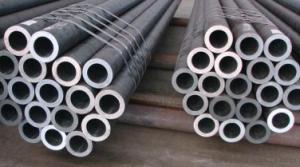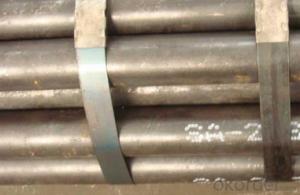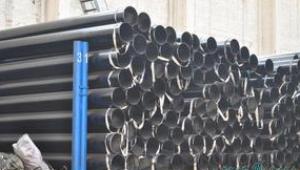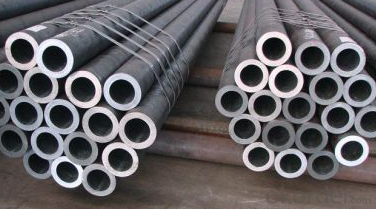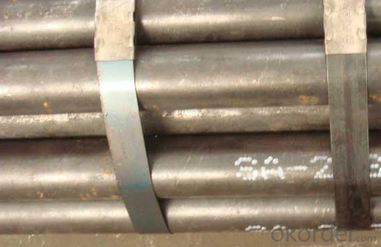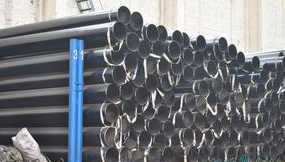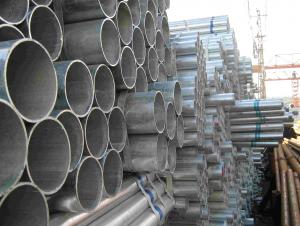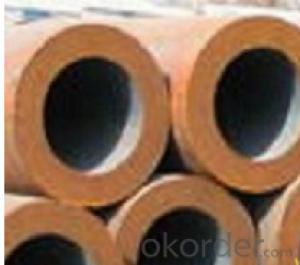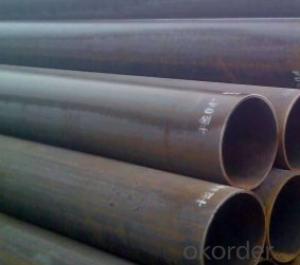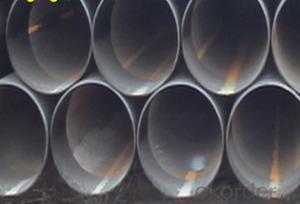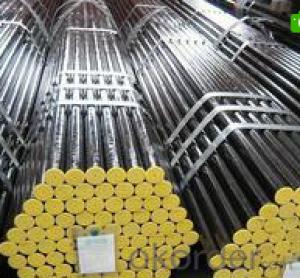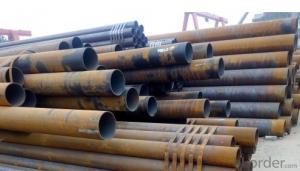Schedule 40 ASTM A53 API 5L GR.B Carbon Seamless Steel Tubes X560 CNBM
- Loading Port:
- Qingdao
- Payment Terms:
- TT OR LC
- Min Order Qty:
- 10 pc
- Supply Capability:
- 30 pc/month
OKorder Service Pledge
OKorder Financial Service
You Might Also Like
Quick Details
| Thickness: | 2.0 - 85 mm | Section Shape: | Round | Outer Diameter: | 17 - 914.4 mm |
| Secondary Or Not: | Non-secondary | Application: | Oil Pipe | ||
| Technique: | Hot Rolled | Certification: | API | Surface Treatment: | VARNISH PAITING |
| Special Pipe: | API Pipe | Alloy Or Not: | Non-alloy | END: | PLAIN,BEVELED OR THREADED |
| Grade: | 10#,20#,16Mn,A106(B,C),A210,A335 P5,A335 P91,A53(A,B),API J55,API K55,Q195,Q235,Q345,St37,St52,10#-45#,A53-A369,API J55-API P110,Q195-Q345,ST35-ST52 | Standard: | API 5CT,API 5L,ASME B36.19M-2004,ASTM A106-2006,ASTM A179-1990,ASTM A182-2001,ASTM A53-2007,BS 1387,DIN 1629/3,DIN EN 10216-1-2004,GB 5310-1995,GB/T 3091-2001,GB/T 8162-1999,GB/T 8163-1999,JIS G3454-2007,API,ASTM,BS,DIN,GB,JIS |
Packaging & Delivery
| Packaging Detail: | standard packing suitable shipping by sea.fixed length as customers' requirements, or SRL or DRL. Varnish, painting or galvanized, or FBE ,2PE,3PE 3pp coating,bevelled/plain/threaded ends with caps, packing in bundle (OD smaller than 141.3mm) big sizes packing in loose, marking as required. Shipped by sea,by air,by train . or some samples shipped by DHL,EMS,TNT,FEDEX ect. Length shorter than 5.85m should be shipped by 20' container, 5.85-12m shipped by 40' container. |
| Delivery Detail: | 7-35 days after advance payment |
Product Description
Seamless steel pipes, a large number of used pipes conveying fluids, such as transport oil, natural gas, gas, water pipes and some solid materials, and so on. Compared to other steel and solid steel bar, the same torsional strength in bending, lighter, is an economic cross-section steel, widely used in the manufacture of structural parts and mechanical parts, such as drill pipe, automotive drive shafts, bicycle rack and construction using steel scaffolding ring with steel pipe manufacturing parts, can improve material utilization, simplify the manufacturing process, saving material and machining time, such as bearing rings, jack sets, has been widely used to manufacture steel. Steel or a variety of conventional weapons indispensable material, gun barrels to make steel. Steel shapes in different cross-sectional area can be divided into tube and shaped tubes. As in the perimeter of equal conditions, the largest area of a circle with a circular tube can carry more fluid. In addition, the circular cross section to withstand internal or external radial pressure, the force is uniform, so the vast majority of the pipe is pipe.
- Q: What are the alternatives to steel pipes for various applications?
- There are several alternatives to steel pipes for various applications. Some common alternatives include pipes made from materials such as plastic (polyvinyl chloride or PVC), copper, cast iron, and ductile iron. Each alternative offers different benefits and drawbacks depending on the specific application, cost, durability, and environmental considerations.
- Q: Can steel pipes be used for transporting drinking water?
- Indeed, steel pipes have the capacity to transport drinking water. These pipes are extensively employed in water distribution networks and have a long history of usage. Renowned for their robustness, potency, and ability to resist corrosion, steel pipes are highly favored. Nonetheless, it is imperative to ensure that steel pipes designated for drinking water transportation are adequately coated or lined in order to avert any potential contamination originating from the metal. Moreover, it is crucial to conduct routine inspections and maintenance to safeguard the pipes' integrity and to forestall any leaks or ruptures that could jeopardize the water's quality.
- Q: How are steel pipes used in the construction of oil storage tanks?
- Steel pipes are commonly used in the construction of oil storage tanks as they provide strength, durability, and corrosion resistance. These pipes are used to connect various components of the tank, such as the walls, roof, and bottom, ensuring a secure and leak-proof structure. Additionally, steel pipes are also used to transport oil within the tank and for the installation of necessary fittings, valves, and other equipment.
- Q: Can steel pipes be used for transporting gases?
- Yes, steel pipes can be used for transporting gases. Steel pipes are commonly used for gas transportation due to their high strength, durability, and resistance to corrosion. They can effectively withstand high pressure and temperature conditions, making them a reliable choice for gas transmission systems.
- Q: How are steel pipes used in the wastewater treatment industry?
- Steel pipes are commonly used in the wastewater treatment industry for various purposes, including the transportation of wastewater from one area to another, the distribution of treated water to different locations, and the construction of infrastructure such as pumping stations and treatment plants. Due to their durability, resistance to corrosion, and ability to withstand high pressure, steel pipes are essential components in the efficient and reliable operation of wastewater treatment systems.
- Q: Can steel pipes be used for firefighting systems?
- Indeed, firefighting systems can utilize steel pipes. Steel pipes are frequently chosen for their robustness and ability to endure high temperatures, making them ideal for transporting water and other fire-suppressing agents. Typically, these pipes are employed in larger commercial or industrial structures that necessitate a larger flow rate and pressure for their fire protection systems. Additionally, steel pipes possess the benefit of withstanding external forces and impacts, thus ensuring the integrity of the firefighting system. Moreover, steel pipes offer the convenience of easy connection, simplifying installation and maintenance procedures. Nonetheless, it is crucial to ensure that the steel pipes employed in firefighting systems undergo appropriate treatment to prevent corrosion and rusting, as these factors may compromise their effectiveness during emergency situations. Regular inspections and maintenance are necessary to guarantee the reliability and functionality of the steel pipes within the firefighting system.
- Q: Can steel pipes be used for underground water supply networks?
- Yes, steel pipes can be used for underground water supply networks. Steel pipes are durable, resistant to corrosion, and have high strength, making them suitable for carrying water underground. Additionally, steel pipes can withstand high pressure and temperature variations, ensuring a reliable and long-lasting water supply system.
- Q: How are steel pipes used in agriculture?
- Various purposes in agriculture make steel pipes widely used, with one common application being irrigation systems. These pipes, known for their durability and ability to withstand water pressure, transport water from wells or reservoirs to different areas of farms, enabling efficient water distribution over long distances. Furthermore, steel pipes find utility in agricultural drainage systems. By removing excess water from fields, they prevent waterlogging and ensure proper drainage. Their resistance to corrosion is particularly significant in agricultural settings, where exposure to moisture and various chemicals is common. Moreover, steel pipes serve a vital purpose in the construction of greenhouse structures. They provide structural support for the greenhouse framework and facilitate the installation of irrigation systems and other equipment. The strength and sturdiness of steel pipes enable them to withstand harsh weather conditions, making them an ideal choice for greenhouse construction. Additionally, livestock farming benefits from the use of steel pipes. They are frequently employed in the creation of fences and enclosures for animals, providing a secure and long-lasting barrier. Steel pipes also play a crucial role in the construction of animal shelters and barns. To summarize, steel pipes play a crucial and versatile role in agriculture. They are integral components in irrigation systems, drainage systems, greenhouse construction, and livestock farming. Thanks to their durability, strength, and resistance to corrosion, steel pipes are an excellent choice for a wide range of agricultural applications.
- Q: How are steel pipes used in plumbing systems?
- Steel pipes are commonly used in plumbing systems due to their durability and strength. They are typically used for water supply lines, sewage lines, and gas lines. Steel pipes are resistant to corrosion, making them a reliable choice for long-term use. They are often used in high-pressure systems and are known for their ability to withstand extreme temperatures. Additionally, steel pipes are easily accessible and cost-effective, making them a popular choice in plumbing installations.
- Q: How are steel pipes protected against soil movement or settlement?
- Various methods can be employed to safeguard steel pipes against soil movement or settlement. One prevalent approach involves the utilization of protective coatings on the pipes, which act as a barrier between the steel and the soil. By preventing direct contact and reducing the chance of corrosion, these coatings offer effective protection. Epoxy, polyethylene, and zinc are among the coatings commonly employed for this purpose. Another method entails the implementation of cathodic protection. This technique involves the installation of sacrificial anodes along the pipeline. These anodes corrode instead of the steel pipes, thus shielding them from potential harm caused by soil movement or settlement. Furthermore, ensuring proper design and installation techniques is crucial for protecting steel pipes in these scenarios. Engineers must take into account factors such as soil composition, slope stability, and the likelihood of ground movement when designing the pipeline route. Additionally, employing appropriate trenching and bedding techniques guarantees adequate support and protection against settlement. Regular inspection and maintenance play a crucial role in protecting steel pipes against soil movement or settlement. By monitoring the condition of the pipeline, including the protective coatings and cathodic protection systems, potential issues can be identified promptly, allowing for timely repairs or replacements. In conclusion, a combination of protective coatings, cathodic protection, proper design and installation techniques, and regular maintenance effectively safeguards steel pipes from soil movement or settlement.
Send your message to us
Schedule 40 ASTM A53 API 5L GR.B Carbon Seamless Steel Tubes X560 CNBM
- Loading Port:
- Qingdao
- Payment Terms:
- TT OR LC
- Min Order Qty:
- 10 pc
- Supply Capability:
- 30 pc/month
OKorder Service Pledge
OKorder Financial Service
Similar products
Hot products
Hot Searches
Related keywords
